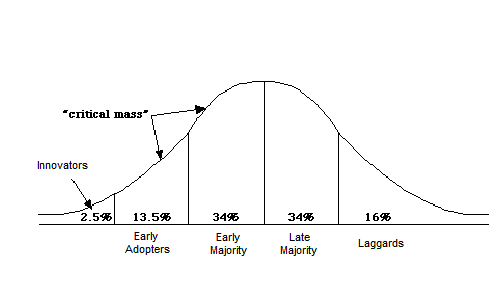
In a book titled Diffusion of Innovations written by Everett Rogers, Rogers outlines a model for the adoption and diffusion of innovation. When it comes to adopting new technology, health care is notoriously known to be part of the "late majority" or "laggard" groups. Some argue that the use of internet computing for communication in health care has not changed in decades!
Well, that is all hopefully beginning to change. The recently enacted stimulus bill — the American Recovery and Reinvestment Act of 2009 (ARRA) has allocated $19 billion to promote the adoption and use of health information technology (HIT), with a focus on electronic health records (EHRs). In a Perspectives piece published in the New England Journal of Medicine on April 9th, Dr. David Blumenthal, the newly appointed National Coordinator for Health Information Technology, discusses the challenges and goals of stimulating the adoption of HIT.
As discussed in the piece, currently, only 17% of US doctors and only 10% of US hospitals are using even the most basic form of EHR. Because of the substantial upfront cost, the perceived lack of financial return from investing in HIT, the technical and logistical challenges involved in installing, maintaining, and updating them, and consumers' and physicians' concerns about the privacy and security of electronic health information, the medical field has decided not to jump on the technology bandwagon. While Washington DC does have a plan to incentivize physicians and health systems to adopt EHR through Medicare and Medicaid benefits, much work needs to be done. Substantial investments need to be made to create an interoperable system that is flexible to new technology updates, yet provides security and privacy. President Obama has promised that by 2014 every American will benefit from having a personal EHR. Just like the IHI WHO Surgical Safety Checklist Sprint, laying down the foundations of this HIT system will be a race--not quite a marathon in duration. Let's call it the 10K HIT race.
Since the HIT race started with announcement of the ARRA, President Obama and several partnerships have provided several refreshing swigs of water. Last Thursday, President Obana, along with Department of Defense (DoD) Secretary Robert Gates and Veterans Administration (VA) Secretary Eric Shinsheki, announced the commitment to create a Joint Virtual Lifetime Electronic Record, a system to computerize medical records for all military personnel. This Joint Virtual Lifetime Electronic Record would effectively bridge the records the DoD holds on active-duty men and women and the records the VA holds on veterans. With the military leading the way as it has done on several occasions in the past, President Obama is sending the message that an investment in HIT is not just to bring technology to health care, but to improve the quality of health care delivery, the health of populations, and the efficiency of our health systems. President Obama hopes that the military system will become a model for the rest of the nation to adopt. Click here to read the release.
Side note: Dr. Don Berwick was asked to appear on NewsHour with Jim Lehrer to discuss this new announcement of a streamlined military EHR and its implications on health care. See the video below!
Having trouble viewing? Click here to watch a streaming video clip, read the transcript, or download the audio clip.
Other spurts of refreshing water have come from partnerships. GE Healthcare announced a partnership with both the CDC and Johns Hopkins to create an easy way to report and target alerts on epidemics. Click here to read Business Week's coverage. Mayo Clinic has partnered with IBM to create a website to consolidate the tools used to search records and data of all kinds. Click here to read The New York Times' report on the new project called, the Open Health Natural Language Processing Consortium.
What other sorts of sprints or 10K races has the government or military led in the past? What features of an EHR are most important to you? How do you think EHRs will transform health care delivery?





7 comments:
The Obama bill has a pretty interesting way to encourage hospitals to deploy healthcare IT. There is, of course, the massive spending and the creation of new health IT czars to help oversee the process. But the interesting thing, if you read the bill, is the way it uses financial incentives to first "pay" doctors/hospitals to use the healthcare IT and then, after a few years, to force doctors/hospitals who don't use the IT to pay a fine.
bnjammin:
Sometimes a little push is needed? What are your concerns about financial incentives and then fines?
How does this WSJ piece referencing Drs. Mandl and Kohane's NEJM Perspective resonate with you?
Do electronic medical records make hospitals safer? Read this Boston Globe article for the answer!
What other types of health IT innovations can be brought into health care outside of EMR/EHR? What kinds of benefits do you think this will bring to health care? Check out this Health Populi blog post on mobility in health care to get those brain juices flowing!
As a patient early adopter to EMR, what kinds of technicalities should you consider? Some of these are considered here in a New York Times article providing a brief evaluation of four current commercial EMR systems available. Click here to read.
Google does it again! Using technology to improve health systems. Read the short testimonial from Atlanta's WellStar Health System after adopting the Google Search Appliance on the Google Enterprise Blog here.
That's really a fantastic post ! I added to my favorite blogs list..
I have been reading your blog last couple of weeks and enjoy every bit. Thanks Love meter and html to pdf
Post a Comment